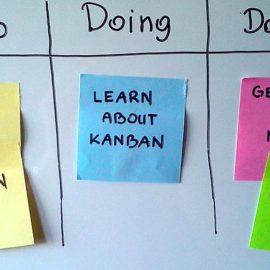

This article is an excerpt from the Shortform book guide to "Leaders Eat Last" by Simon Sinek. Shortform has the world's best summaries and analyses of books you should be reading.
Like this article? Sign up for a free trial here .
Why is it important to foster empathy in the workplace? What are the consequences of a lack of empathy in an organization?
According to management theorist Simon Sinek, empathy in the workplace fosters a supportive environment by combating abstraction through the release of oxytocin. When empathy is absent, people see each other as abstract concepts rather than people. As a result, they focus on their own benefits, rather than the common goal.
Read about the importance of empathy in the workplace, according to Sinek.
Empathy Combats Abstraction
The importance of empathy in the workplace cannot be underestimated. According to Simon Sinek, empathy combats abstraction. Combating abstraction means forcing yourself and your subordinates to see your customers, suppliers, and each other as people rather than abstract ideas. This is another way to strengthen supportive environments. According to Sinek, social contact releases oxytocin. When you don’t have social contact with other people, you stop producing oxytocin and therefore stop feeling empathy for those people: They become abstract ideas rather than people.
When that happens, your focus shifts to what you can understand concretely: your own safety. For company leaders, this usually manifests as making decisions that maximize profits without considering how those decisions will affect consumers and employees. For employees, this manifests as following orders, even if the company or customers would be harmed by those orders. Thus, everyone focuses only on their own benefit, rather than supporting each other or helping the company grow, destroying the supportive environment.
How to Combat Abstraction
In today’s globalized world, most companies don’t have social contact with their customers, suppliers, or even employees, but that doesn’t have to cause a shift to abstraction. Sinek recommends a couple of methods for combating abstraction and strengthening your supportive environment:
1. Interact with your suppliers, employees, and customers in person as much as possible, and help your subordinates do the same, Sinek says. Doing so reminds you that you’re working with people and gives your brain the opportunity to produce oxytocin and form trusting relationships.
(Shortform note: Sinek points out that interacting with people in person helps your productivity by strengthening the supportive environment. Ken Blanchard and Sheldon M. Bowles suggest in Raving Fans that these kinds of interactions can be profitable in a more immediate way as well: When you continually interact with your customers, suppliers, and coworkers, you give them the opportunity to provide feedback. They can alert you to any potential issues and help you adjust your processes and customer service to be the most profitable and productive possible.)
2. Interact with people you’ve helped. As discussed above, inspiration encourages hard work and determination. Seeing the positive effect your efforts have on others inspires you to continue in those efforts. This is why volunteering at a soup kitchen can feel more fulfilling than donating money: Volunteering is more concrete and feels more meaningful.
Abstraction and Empathy Fatigue
While distance can certainly cause you to start seeing others as abstractions rather than people, as Sinek says, experts warn that spending too much time with others can do the same thing. When you spend a lot of time helping people through highly stressful situations, you develop “empathy fatigue.” Also known as secondary traumatic stress disorder—since you witness someone else experiencing a trauma, rather than experiencing it yourself—empathy fatigue is a state of stress and exhaustion where you become unable to care about or empathize with others.
Empathy fatigue likely results from a combination of cortisol and oxytocin. As discussed above, oxytocin allows you to feel empathy—where you understand a situation as if you were the person experiencing that situation. When you form empathetic connections with people going through stressful or traumatic experiences, your body starts producing cortisol and you feel that stress and trauma yourself. When this occurs, you’re more likely to withdraw from those empathetic connections: You stop empathizing in an attempt to protect yourself, which reduces other people to abstract ideas rather than people.
Thus, while interacting with people you’ve helped, as Sinek suggests, can inspire and motivate you, be cautious. Be mindful of how helping others is affecting you emotionally, and remember to practice self-care through eating healthily, getting enough sleep, and spending time doing things you enjoy. In addition, interacting with loved ones who aren’t going through stressful or traumatic experiences can help overcome empathy fatigue.

———End of Preview———
Like what you just read? Read the rest of the world's best book summary and analysis of Simon Sinek's "Leaders Eat Last" at Shortform .
Here's what you'll find in our full Leaders Eat Last summary :
- Why a leader must prioritize her subordinates’ needs above her own
- How empathy and support can be strong managerial tools
- Why you must see your customers, suppliers, and employees as people






